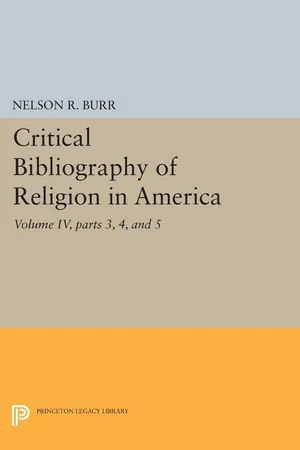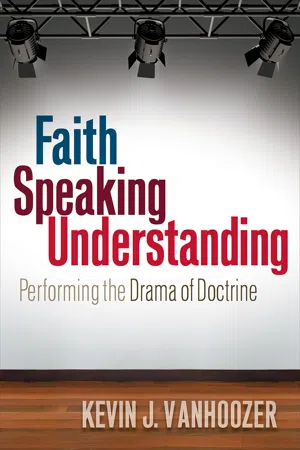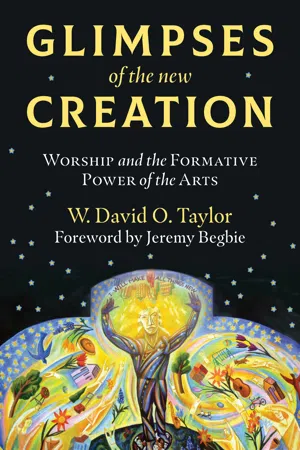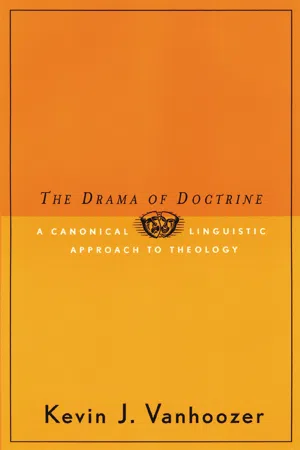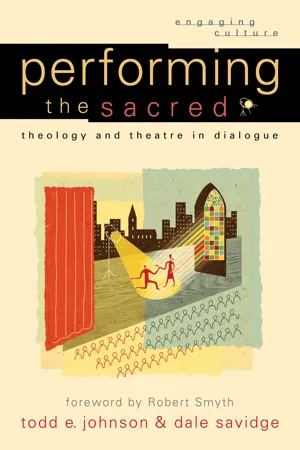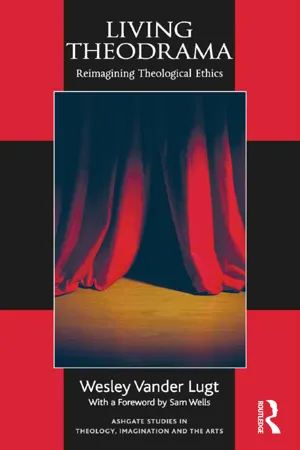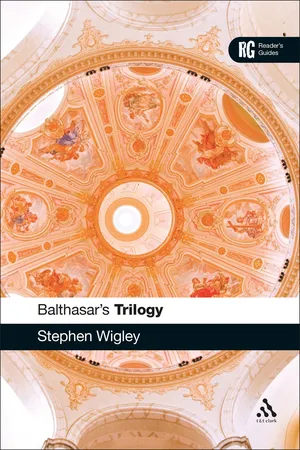Literature
Christian Drama
Christian drama refers to theatrical works that are based on Christian themes, stories, or characters. These plays often explore moral and religious themes, and are performed within a Christian context. Christian drama has a rich history, with roots in medieval mystery plays and morality plays, and continues to be a significant genre in contemporary theater.
Written by Perlego with AI-assistance
Related key terms
1 of 5
8 Key excerpts on "Christian Drama"
- Nelson Rollin Burr(Author)
- 2015(Publication Date)
- Princeton University Press(Publisher)
He reviews the battle in the modern theater between commercialized "es- capism" and the art of interpreting the struggles of human souls, and hopefully notices the rise of church dramatic groups, and growing cooperation between religious and theatrical leaders. Preston A. Roberts, Jr., "A Christian Theory of Dramatic Tragedy," in Journal of Religion, Vol. 30, no. ι (Jan. 1951), pp. 1-20, from the standpoint of Christian theology considers the nature of dramatic tragedy as a literary form, as (for example) in Hawthorne and Mel- A R T S A N D L I T E R A T U R E ville. He contrasts the irresistible doom in Greek tragedy with the Christian trust in God, who is not an enemy, a void, or a vague ideal, but a suffering servant and friend. Christian tragedy moves from knowledge through sin to judgment and forgiveness, reenacting the passion and resurrection. George B. Kernodle, "Patterns of Belief in Contemporary Drama," in Sfirkual Problems in Contemforary Literature, ed. Stanley Romaine Hopper (New York, 1952) is con- cerned with plays that are not specifically religious but deal seriously with man's relation to the world, his fellow men, and God. They dramatize Biblical events, historic religious figures, or contemporary religious problems. Playwrights have discovered that a truly inward and idealistic religious faith can remould the world in its image. One should consult also, in the same collection of essays, Theodore Spencer, "Man's Spiritual Situation as Reflected in Modern Drama." B. General History and Bibliografhy of American Drama Arthur Hobson Quinn, History of the American Drama, from the Beginning to the Civil War (New York, 1943, 2nd ed.) has a list of plays, and a bibliography. His A History of the American Drama from the Civil War to the Present Day (New York and London, 1937, rev · ec ^-, 2 vols, in 1) also has a general bibliography and a list of American plays, 1860-1936.- eBook - ePub
Faith Speaking Understanding
Performing the Drama of Doctrine
- Kevin J. Vanhoozer(Author)
- 2014(Publication Date)
- Westminster John Knox Press(Publisher)
in front of the doctrine. This refers to the present scene in which the church finds itself and to the very real demand on disciples to participate fittingly in the ongoing triune action, thus demonstrating their understanding of senses 1 and 2 (above). Here Scripture functions as prompt and prescript, encouraging the people of God to display the meaning and truth of the gospel by living in wise ways that exhibit the mind of Christ in bodily (i.e., corporate) form.Doctrine is dramatic, then, because it concerns the church’s efforts to perform it, to speak and show its understanding of what God is doing in Christ to renew creation. Disciples are not onlookers who keep a safe distance but witnesses who stake their lives on the good news that the triune God is actively at work in all situations to rescue and redeem. What the church needs now are not passive spectators but active participants, actors who can follow doctrinal directions.“Drama” of RedemptionMany writers refer to the “drama” of redemption. Is it only a figure of speech? As mentioned previously, the essence of drama is persons presenting themselves to one another, largely through language, but also through deeds. This is precisely what God does in making himself known to Adam, Abraham, Moses, and others. Divine address and human response comprise the two-beat rhythm of the history that forms the backbone of biblical narrative. The medium of theater, like theology, is interpersonal interaction. And if having a plot that unifies this interpersonal interaction is a necessary and sufficient condition of drama, then the history that Scripture recounts is indeed dramatic.Erving Goffman uses the theater as a framework for conducting sociological research. The way persons present themselves to others in everyday life is similar to the way an actor renders a character to an audience. Goffman’s particular interest involves the ways individuals try to control the impressions that others form of them. They do so through their self-presentations (i.e., performances), “all the activity of a given participant on a given occasion which serves to influence in any way any of the other participants.”27 As we shall see in later chapters, this theatrical framework opens up new possibilities for thinking about hypocrisy. The salient point, however, is that the theater is, for Goffman, a conceptual scheme that allows him further to explore the human condition.28 - eBook - ePub
Glimpses of the New Creation
Worship and the Formative Power of the Arts
- W. David O. Taylor, Jeremy Begbie(Authors)
- 2019(Publication Date)
- Eerdmans(Publisher)
HAPTER 8Worship and the Theater Arts The story of God is theatrical. Every part of it could be its own play.Alison Siewert, Drama Team HandbookThe theater of God in which the drama of Jesus Christ was played out was already in existence before the church fathers began to exhort the Christians to go to the theater of God: Christian Drama had begun with the memorial act of the breaking of bread of the Last Supper.Christine C. Schnusenberg, The Mythological Traditions of Liturgical DramaI’m baptizing you here in the river, turning your old life in for a kingdom life. The real action comes next: The main character in this drama—compared to him I’m a mere stagehand—will ignite the kingdom life within you, a fire within you, the Holy Spirit within you, changing you from the inside out.Matthew 3:11 (The Message)In his introduction to Improvisation: The Drama of Christian Ethics, Samuel Wells suggests that the disciplines and practices of improvisation “resemble the disciplines and practices of Christian ethics sufficiently closely.”1 Improvisation, he explains, is a matter of steeping oneself years “in a tradition so that the body is so soaked in practices and perceptions that it trusts itself in community to do the obvious thing.”2 What does this have to do with corporate worship? Wells answers: “For Christians the principal practice by which the moral imagination is formed, the principal form of discipleship training, is worship.”3In worship “Christians seek in the power of the Spirit to be conformed to the image of Christ—to act like him, think like him, be like him.”4 - eBook - PDF
- Elizabeth Schafer(Author)
- 2019(Publication Date)
- Methuen Drama(Publisher)
Any attempt to think about theatre and Christianity also has to grapple with the questions of which theatre and which Christianity. In different historical periods and in different Christian cultures, attitudes towards theatre have varied widely. For example, in 1606, in England, the Act to Restrain Abuses of Players was designed to censor jest-ing or profane use of the names of ‘God’ or ‘Jesus’ during the performance of stage plays. Later, Victorians were often pious – in the legitimate theatre – about what could, and could not, be staged, and impersonating the Holy Family – Jesus, Mary and Joseph – was outlawed. Today, if profes-sional theatre makes Christianity its subject matter, satire and disrespect are likely. But ‘Christianity’ covers a wide range of beliefs and practices. It is (probably) uncontroversial 3 to define Christianity as a monotheistic, Abrahamic reli-gion grounded in and inspired by the teachings of Jesus of Nazareth (ca. 4 BC to ca. AD 30). Most Christians believe that God, the creator, became incarnate, or embodied, as Jesus; that Jesus died to save human beings by reconnecting them with God and by taking away their ‘sins’; and that Christ rose from the dead, promising that there is more to life than the merely material. However, that working definition might well offend plenty of people who define themselves spiritu-ally or culturally as Christian. As ‘Christianity’ is a label that covers such a diverse body of people and practices across his-tory, with widely differing views on everything, including theatre, the concept of Theatre & Christianity will mean something very different according to cultural context and whether the Christianity in question is Quaker, Rastafarian, Methodist, Roman Catholic, Seventh-day Adventist, Eastern Orthodox, Baptist, Jehovah’s Witness, Russian Orthodox, LGBTQI * affirming, Taizé, Evangelical, syncretist, Mormon, Anglican, etc. - eBook - ePub
The Drama of Doctrine
A Canonical-Linguistic Approach to Christian Theology
- Kevin J. Vanhoozer(Author)
- 2005(Publication Date)
- Westminster John Knox Press(Publisher)
The Elements of Drama (Cambridge: Cambridge University Press), chap. 3.2 . Part 1 focuses on seeing the gospel as a theo-drama but only begins to apply the analogy of drama to Scripture and theology. Part 2 offers a fuller account of my theo-dramatic recasting of the Scripture principle, and parts 3 and 4 do the same for our understanding of theology and the church, respectively.3 . Richard Heyduck makes a similar proposal in The Recovery of Doctrine in the Contemporary Church: An Essay in Philosophical Ecclesiology (Waco, TX: Baylor University Press, 2002), also in connection with a critique of Lindbeck’s cultural-linguistic theory. Three comments concerning the differences between our two approaches are perhaps in order: (1) though Heyduck uses the category “drama,” he fails to engage either Balthasar or any works on drama theory and criticism; (2) Heyduck does not deal with Scripture as the church’s script, as I do here; (3) for Heyduck, “narrative” is arguably a more important category than “drama” in that doctrine “is essentially an articulated understanding of our life in the Christian narrative” (192). It is also worth pointing out that Heyduck shows no awareness of my earlier work (Kevin J. Vanhoozer, “The Voice and the Actor,” in Evangelical Futures: A Conversation on Theological Method , ed. John G. Stackhouse [Grand Rapids: Baker, 2000], 61–106, esp. 93) in which I first presented the directive theory of doctrine, even though it was published in 2000.4 . See, for example, Susan Bennett, Theatre Audiences: A Theory of Production and Reception , 2d ed. (London and New York: Routledge, 1997). See also Edwin Wilson, The Theatre Experience , 3rd ed. (New York: McGraw-Hill, 1985), 13–23.5 . Interestingly, the etymology of theater is similar to that of theory , and each is related to a Greek term that stresses “seeing” or “beholding.” I return to the theme of indwelling in part 2 in connection with coming to understand literary genres as social practices.6 . Michael Polanyi, Personal Knowledge - eBook - ePub
Performing the Sacred (Engaging Culture)
Theology and Theatre in Dialogue
- Todd E. Johnson, Dale Savidge, Robert K. Johnston, William Dyrness(Authors)
- 2009(Publication Date)
- Baker Academic(Publisher)
20 It sounds very simple and even simplistic: the mark of a Christian is love, and the Christian artist who creates out of that love will create only work reflective of that love: love for God and love for our neighbor. Art and morality may pull in opposite directions, but they are bound inextricably together by love, and through their tension living works of art may be created.The theatre arts are rooted in our humanity. Both actors and audiences must be present in their bodies and spirits for theatre to happen. What passes between them (the text of a play, a characterization, etc.) is on both ends, the senders and the receptors, a product of their humanity. A relationship is established, however fleetingly, and like all relationships for a Christian, this one is governed by the greatest commandment: to love. Such an ideal is not achievable without the empowering presence of the Spirit of God, and only in submission to God will the Christian artist and audience satisfy God’s demands.Realize that you are summoned to a task far beyond your strength. Get to know yourself so well that you cannot contemplate yourself without flinching. Then there will be room for hope. In the sure knowledge that you are “obliged to do the impossible” and that you can do the impossible in Him who strengthens you, then you are ready for a task which can be performed only through the Cross.21The Christian at Church: Being a WorshiperThe role of theatre in the context of church services is part of a larger discussion among Christians on the very nature of worship, approaches to corporate worship, and the relationship of churches to the surrounding culture. Sometimes lost in this discussion (or debate) is the reality that worship is not confined to a church service, and for the Christian artist the very act of creating theatre can be an act of devotion to and worship of the Lord. Frank Burch Brown offers ways in which art can be worship:We can dedicate art to God, address art to God, consecrate it, receive it on God’s behalf, invite God to share the enjoyment, and look at it as something from God. But finally, and most mysteriously, we need to say that a work of art can be loved in God when it has become, itself, a medium whereby God becomes present to us. The artwork or artistic medium is then transformed into something by which the transcendence of God is celebrated or genuinely mediated, not simply reported or honored. Then it is as though God adopted the medium as God’s own.22 - eBook - ePub
Living Theodrama
Reimagining Theological Ethics
- Wesley Vander Lugt(Author)
- 2016(Publication Date)
- Routledge(Publisher)
Finally, Wells acknowledges that improvisation is often associated with triviality and self-indulgence, although this is a misleading stereotype. Improvisation often does involve laughter, but it involves every other human emotion as well. Similarly, the improvised Christian life requires every human emotion, including playful humor, especially because “the joke is God’s and the laughter is divine.” 102 Theodramatic or Theotheatrical? Given the clarifications above, is it still legitimate to describe this book as a study in theo dramatics ? Even though the introduction is framed in terms of the theatrical turn in theology, theodramatic remains the most popular term among contemporary scholars, especially given the formative influence of Balthasar’s Theo-Drama. In keeping with the distinctions above, however, theatrical theology emphasizes the practical goal of theology as faith seeking performative understanding. Dramatic theology highlights rootedness in the drama of Scripture that presents the covenantal dialogue between God and humanity. Dramatic theology is still concerned with performance, but consistency with these terms means the primary focus remains the text, drama, or script providing the plot and patterns for performance. Some advocates of the theatrical turn in theology may desire to distance themselves from the theodrama, together with the primacy of Scripture and its coherent and comprehensive meta-drama. The aim of this book, however, seeks to fuse theo dramatic concerns with a theo theatrical approach. Embracing the theatrical turn in theology does not entail neglecting the drama of Scripture; on the contrary, it makes the most of biblical interpretation and theology by connecting them to faithful performance in everyday life. As such, this book acknowledges the possibility and necessity of dramatic theology while giving full attention to the theatricality and performativity of the Christian life - eBook - PDF
- Stephen Wigley(Author)
- 2010(Publication Date)
- T&T Clark(Publisher)
It is such an idea that ‘provides a link between early, mythic thought and Christian faith’. ‘Christianity alone provides a new approach: God has become man without ceasing to be God’ ( TD2 : 45). This does not involve any diminution of the human drama. ‘The tragic dimension of personal existence is not softened: in fact it is wrenched to its very limit: in the Cross’ ( TD2 : 49). This leads von Balthasar to assert that ‘in Christian terms, the dramatic dimension of human existence can only be taken in complete seriousness – and that accordingly, the Christian revelation can only appear in its full stature – if it is presented as being dramatic at its very core ’ ( TD2 : 51). In turn this leads von Balthasar to set out the characteristics of theo-drama in ‘The Unfolding Drama’. His first point is that since ‘God has made his own the tragic situation of human exist-ence’ there can be ‘No External Standpoint’ ( TD2 : 54). ‘In this play all the spectators must eventually become fellow actors, whether they wish to or not’ ( TD2 : 58). It also means that the old distinctions between ‘lyrical’ and ‘epic’ approaches in theology are overcome in the new approach which challenges the believer to be a ‘witness’ to the drama. ‘We shall not get beyond the altern-atives of “lyrical” and “epic”, spirituality (prayer and personal involvement) and theology (the objective discussion of facts), so long as we fail to include the dramatic dimension of revelation in which alone they can discover their unity’ ( TD2 : 57). It then leads him in ‘Convergence toward Theo-Drama’ ( TD2 : 62–77) to pick up the nine trends of modern theology identified in his Prolegomena . It is a ‘play of freedoms ’ which takes seriously the THEO-DRAMA: THEOLOGICAL DRAMATIC THEORY 87 ‘horizontal history of the individual and mankind’ but at the same time allows for the ‘event’ in which ‘aspects of the end-time and eternity break in’.
Index pages curate the most relevant extracts from our library of academic textbooks. They’ve been created using an in-house natural language model (NLM), each adding context and meaning to key research topics.
